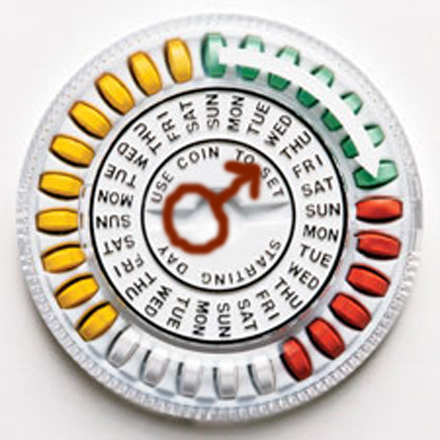
Just in time for flu season’s peak, science may have figured out a reason why some men make wimpy, needy patients compared to women when it comes to infectious diseases.
A report released today in the Proceedings of the National Academy of Sciences (PNAS) links testosterone levels with response to flu vaccine, showing that, as a group, men with higher levels of the male hormone are more likely to have weak, or no response to a flu vaccine, meaning that their bodies don’t mount a strong defense.
In short, they have weaker immune systems than do women, leaving them more vulnerable to severe infections.
“Men are suffering!” Mark M. Davis, the Avery Family Professor of Immunology at Stanford University School of Medicine and an investigator with the Howard Hughes Medical Institute, told NBC News. “They aren’t as resistant. Women are superior. There’s no way around it.”
Science has known for some time that there are gender differences between the immune systems of men and women, differences that can have profound impacts for health and medicine.
For example, while women tend to develop a more robust immune reaction to infection, that strength comes with a cost. Women are much more likely to suffer from autoimmune diseases like lupus, and they are more likely than men to develop Alzheimer’s disease. Men, on the other hand, are more likely to have severe cases of viral, bacterial and parasitic infections.
What mechanisms underlay this phenomenon has been somewhat mysterious. The study released today might help tease apart some of that mystery.
The multinational team from Stanford, France, and the University of North Carolina took blood from 54 women and 37 men of different ages, then studied a variety of immune system proteins and cells using complex systems to detect gene expression. Then they gave flu vaccines to these people and checked for any changes in these parameters. Sure enough, men, as a group, had a more muted response to the vaccine.
Thirty-three women and 10 men responded to the vaccine for the seasonal H3N2 flu strain. Twenty women and 24 men did not respond. (The remaining participants weren’t included due to incomplete or flawed results.)
“Lots of male non-responders had high levels of testosterone,” Davis explained, “while the men with lower testosterone levels had roughly equal responses to females. The high-T men were crappy responders.”
When the team completed the complicated genetic analysis, it found that genes involved with lipid (fats) metabolism – such as the manufacture of cholesterol by the liver – were powerfully associated with response to the vaccine. The more strongly those genes were expressed, and the higher the testosterone, the weaker the response to the vaccine.
To Carol Colton, a Duke University Medical Center professor of neurology who studies the interaction of hormones and the immune system, especially their effects on brain diseases, “that makes perfect sense” because our bodies make estrogen and testosterone from cholesterol, a lipid. The differences between men and women, she explained “are inherent, right down to the gene level.”
Why would evolution instill such differences? Davis speculated – and Colton heartily agreed – that higher testosterone in men is anti-inflammatory and aids the healing of injuries and wounds. Males of most species are more likely than females to suffer trauma. “If you’re in a battle, having lots of testosterone is wonderful,” Colton said.
“So you take a hit to your resistance to infectious disease,” Davis said, “but you gain in case of trauma.”
Davis said he hoped studies like this one would help inform scientists and physicians as new immune-therapies, like cancer vaccines, are developed. “There’s been some neglect in this area,” he said, “that I hope our study, and others, will help to correct.”
And for those who got the flu vaccine but still get sick, a prescription antiviral therapy can lessen symptoms and shorten the duration of the virus, if taken within 48 hours.
Source: FCN






 In recent months, there has been a great deal of contradictory information regarding testosterone. So much so that it is hard for any man to decipher what level is right, and whether seeking an “optimal” level is the preferred course of action.
In recent months, there has been a great deal of contradictory information regarding testosterone. So much so that it is hard for any man to decipher what level is right, and whether seeking an “optimal” level is the preferred course of action.